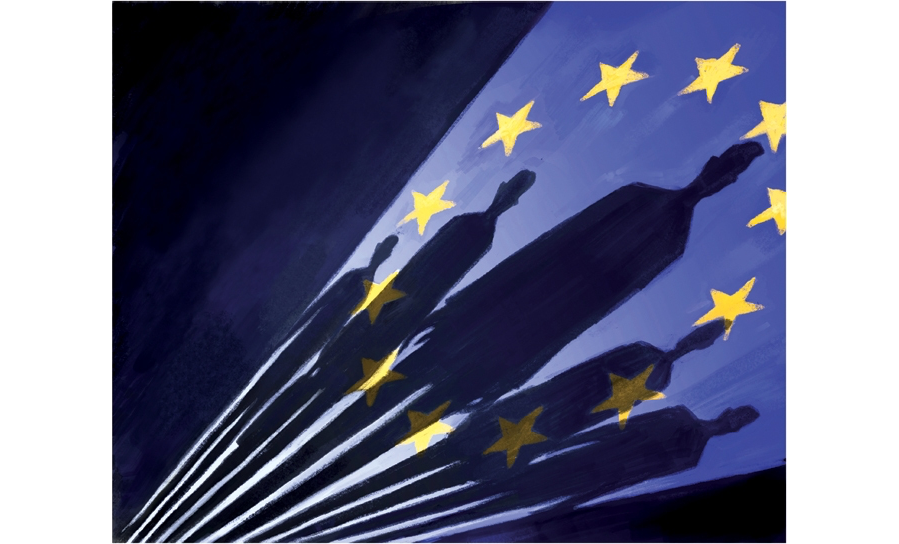Ireland’s political class is facing a moment of truth. Following yesterday’s extraordinary events — with the EU temporarily triggering Article 16 of the Northern Ireland Protocol as part of its desperate effort to manage its self-made vaccines crisis — the Dublin elites have some serious soul-searching to do.
They must now ask themselves if they are willing to be members of this institution that has just treated them with such contempt; which has just signaled in front of the entire world that it does not take Irish sovereignty or Irish democracy very seriously at all.
Contempt is not too strong a word for what the EU has just done to Ireland. Let’s leave to one side what the EU’s overriding of the Brexit deal and temporary triggering of Article 16 tells us about its view of the UK. We already knew that the commissioners and bureaucrats of the Brussels establishment were not well disposed to us Brits, given we voted for Brexit and then had the temerity to get our vaccination program up and running more swiftly and efficiently than the EU did. Brussels is likely to be mad at us for a long time to come.
But Ireland, we were told, was different. The EU loved Ireland. It respected Ireland. It would always stand up for Irish interests. That’s what EU spokespeople and their cheerleaders in both Dublin and London said again and again over the past couple of years. The EU absolutely would not allow Brexit to hurt Ireland. There would be no hard border, no division between north and south, no messing about with the Good Friday Agreement. No way. That was the EU’s red line, we were told.
How quickly and spectacularly that has now fallen apart. In triggering Article 16 briefly yesterday, before quickly backtracking, the EU made it clear that it is more than happy to erect a hard border in Ireland. It confirmed that it is perfectly content to ‘rip up’ the Good Friday Agreement. It revealed that it doesn’t actually care what the Irish government or the Irish people think.
The EU’s plan was clear: it wanted to enforce a vaccines border on the island of Ireland. It intended to subject Northern Ireland to its export controls on vaccines. So the Republic of Ireland, as an EU member, would have been able to receive vaccines produced in the EU, but it would not have been at liberty to transport any of them to Northern Ireland.
That’s about as hard as a border can be: one side would have been allowed to save its citizens’ lives using EU-exported vaccines; the other side would not. This runs counter to all the promises about avoiding borders and maintaining the integrity of the Single Market on the island of Ireland that the EU and its Remainer supporters made incessantly over the past three years.
Could it be that those of us who said the EU was cynically exploiting Irish concerns about the return of a hard border to gain leverage in the Brexit talks were right all along? Well, I never!
But it gets worse. The EU didn’t even consult the Irish government before it triggered Article 16. Think about the magnitude of this. The EU unilaterally decided what should happen on the island of Ireland. It decided to enforce a health border. Like the imperialists of old, it drew a line through post-Brexit Ireland, decreeing how the two parts of the country may relate to one another on the issue of COVID and vaccines.
This sums up the EU’s neocolonial arrogance towards Ireland. It seems to view Ireland as territory that it owns. As a country in which it can do whatever it chooses. Even the EU’s later reversal does not take away from the seriousness of this — Brussels genuinely contemplated enforcing a new border arrangement on the island of Ireland without consulting Ireland’s elected representatives.
This cannot be glossed over. We cannot just say it was a rash, regrettable decision, now averted. No, we need a proper discussion about how the EU views Ireland, and whether Ireland is content to put up with the EU’s demeaning, imperious behavior.
Ireland’s political class must now make a full-throated defense of Irish sovereignty. They must reprimand the EU for what it nearly did. If they fail to do this, then they will be sending a signal to the watching world, one that says they are happy to go from the terrible old days of being ruled by Britain to an equally undesirable situation where they are bossed around by Brussels.
There is a staggering amount of conformism in Irish political and media circles when it comes to the EU. This makes it very difficult indeed to have an open discussion about the subordination of Ireland to the writ of Brussels. I know this from personal experience.
Anyone who points out that the EU does not respect Irish democracy will be shouted down as ‘divisive’ or ‘Europhobic’. Remind people that the EU forced the Irish to vote again when they rejected the Nice and Lisbon treaties in 2001 and 2008 respectively, or that they essentially colonized Ireland’s political institutions using the Troika in 2010, and you will be told to pipe down. ‘Stop making trouble.’ And yet once again we can see how little respect the EU has for Irish sovereign rights.
Some honesty must now cut through the conformism. Ireland surely did not spend centuries struggling for independence only to submit itself to a neocolonial institution like the EU. I, and many others, would like to see Irexit one day. But in the meantime I’d settle for Irish politicians admitting that their sovereignty is being diluted, and instituting a free, frank discussion about whether this is a good thing.
This article was originally published on The Spectator’s UK website.


















